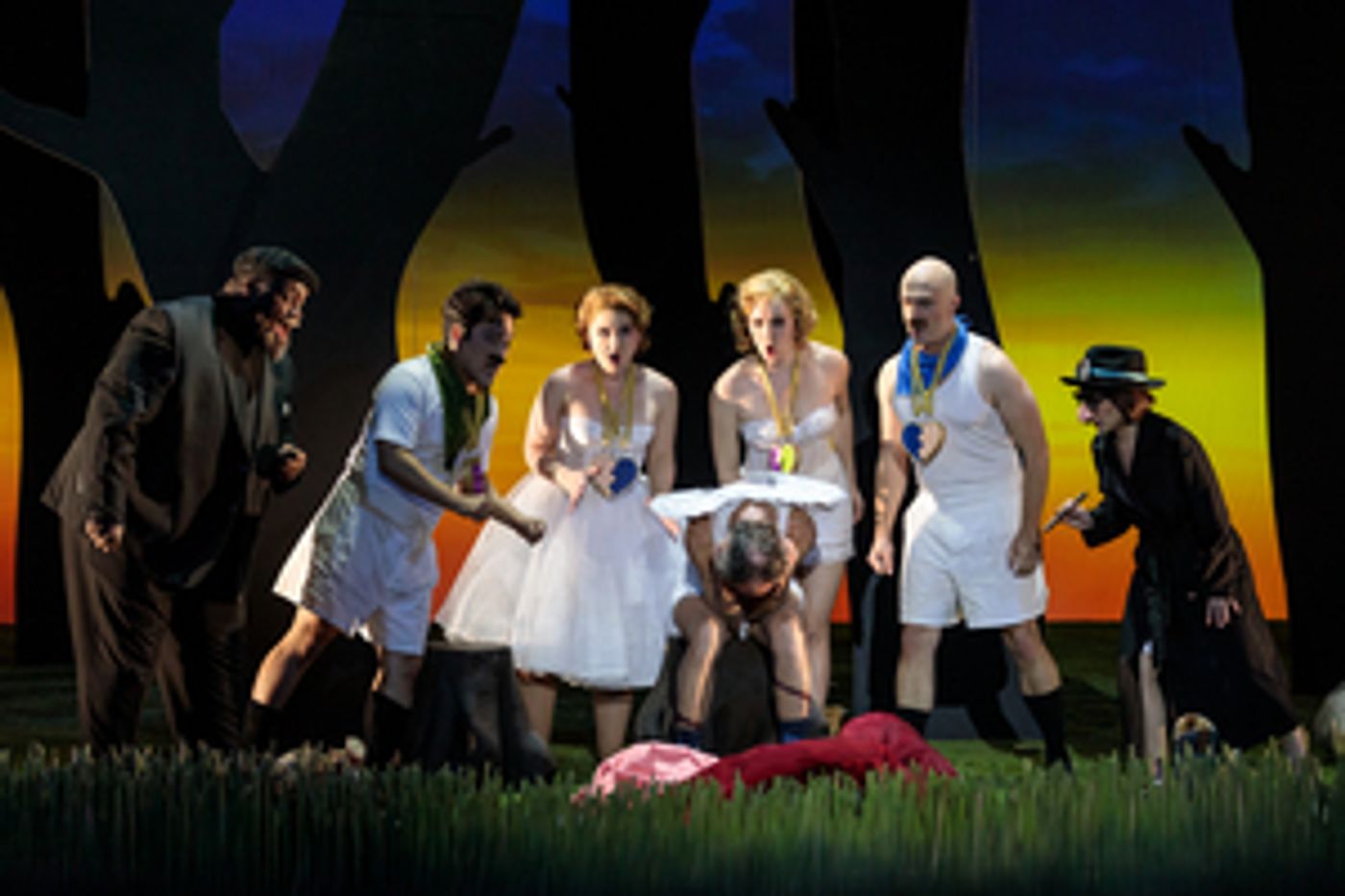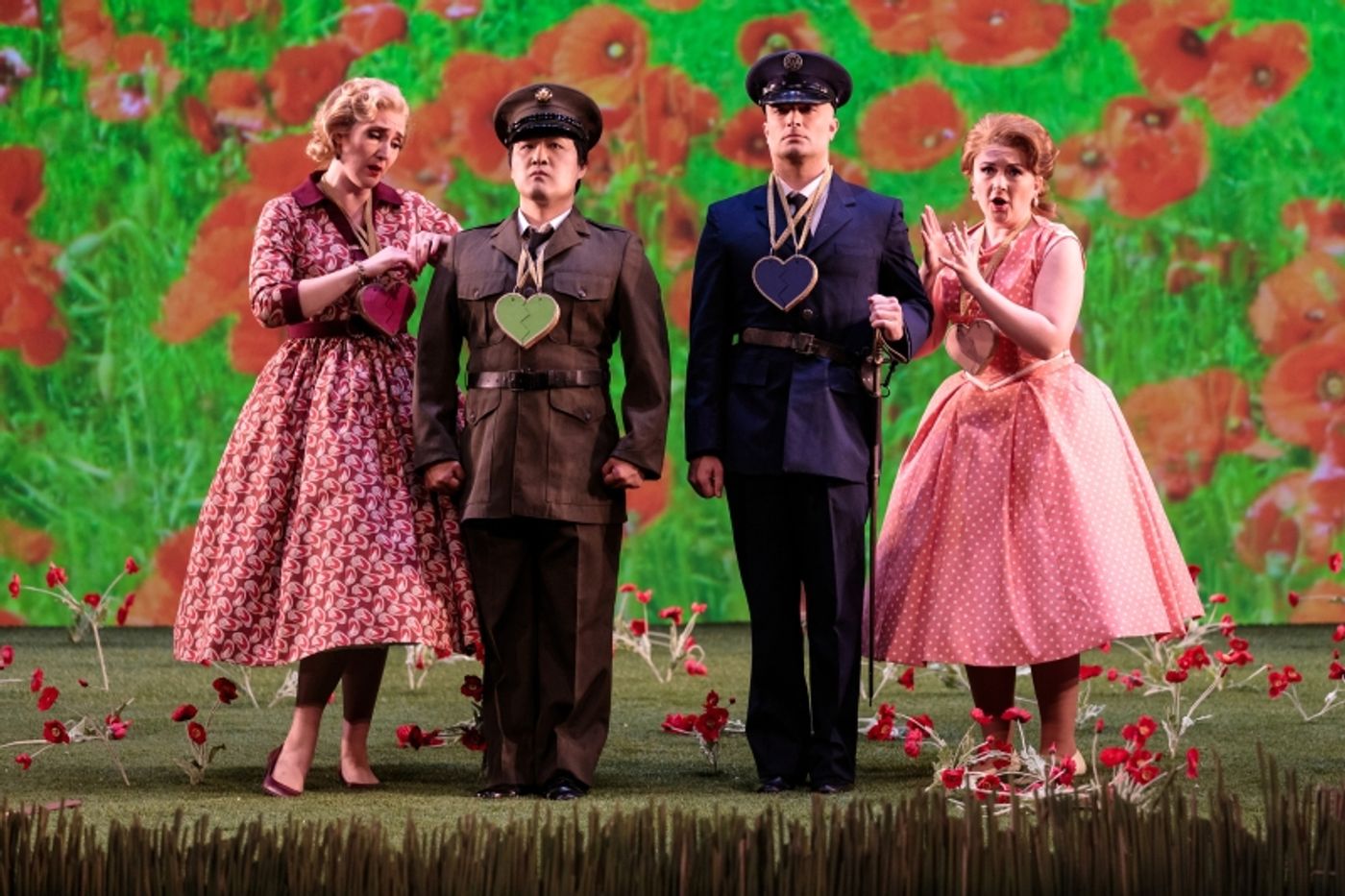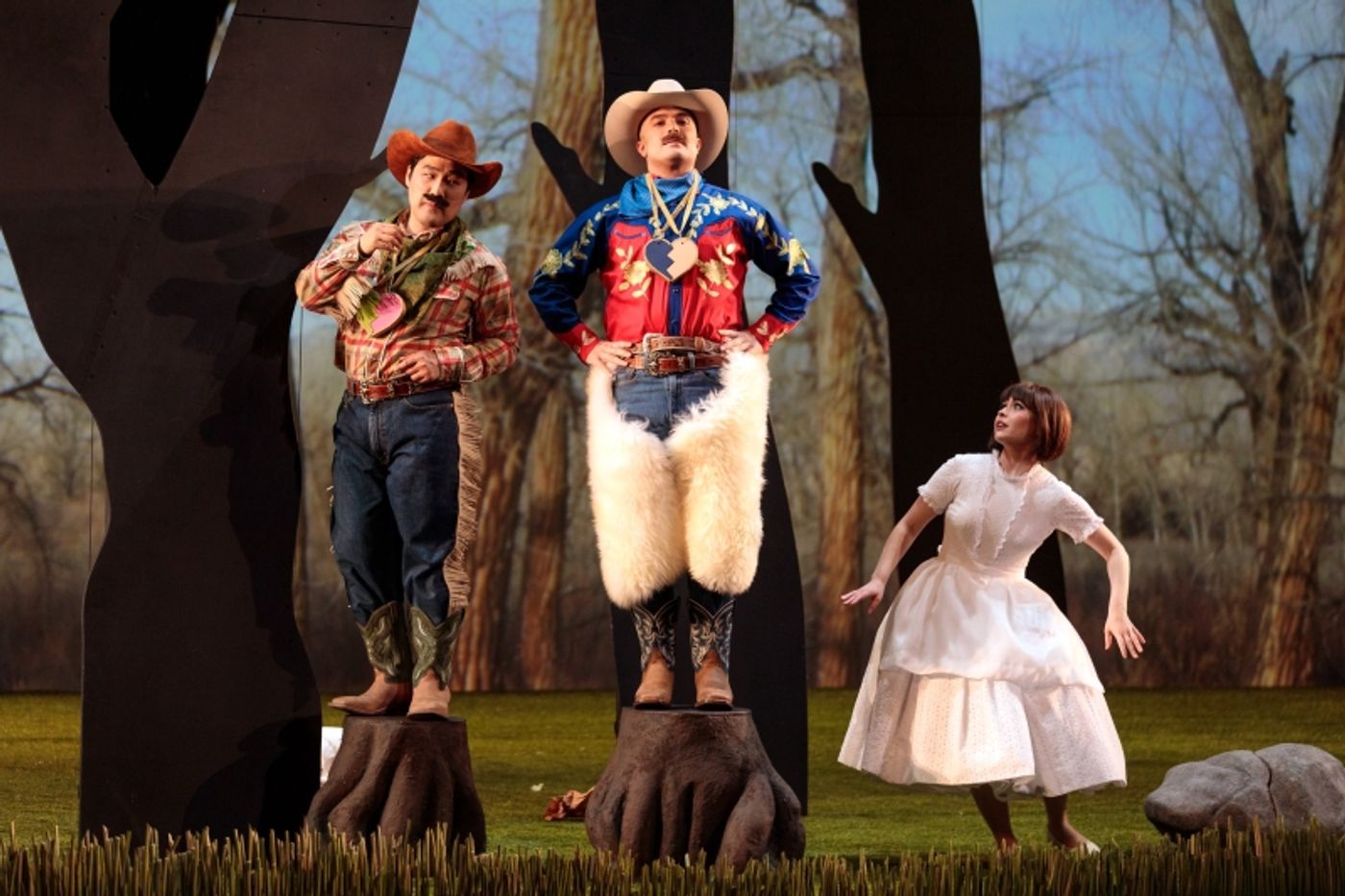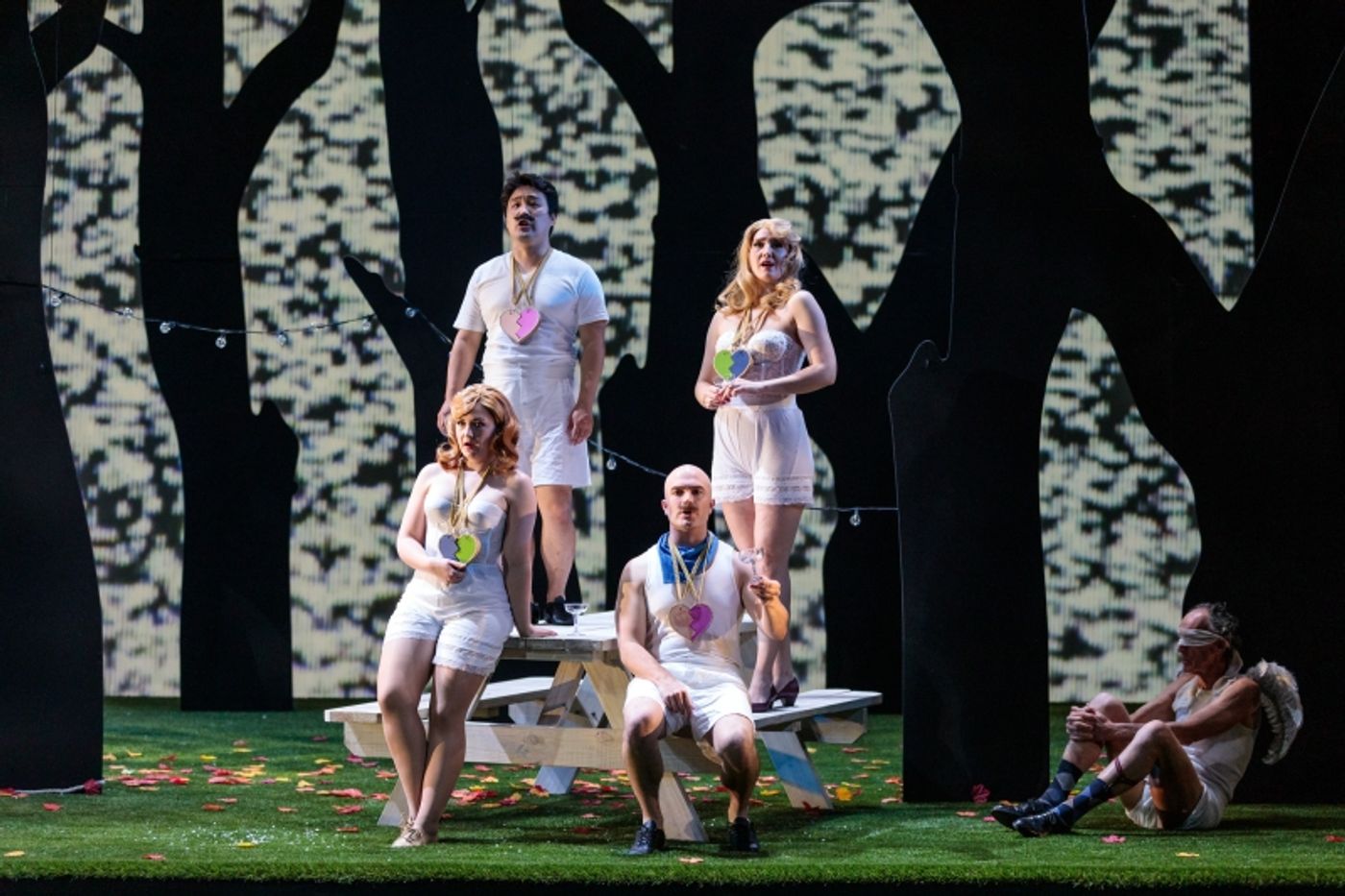Review: San Diego Opera's MOZART'S COSI FAN TUTTE at San Diego Civic Center
Love doesn't spring eternal

I admire the plucky inventiveness of the San Diego Opera. On an annual budget of roughly three percent of New York's Metropolitan Opera, it has managed to mount a consistently appealing and entertaining variety of productions, traditional and contemporary, in both good times and plague times. The latter even forcing an excellent performance of a much-edited La bohème in a hockey-rink parking lot with an audience seated in an armada of vehicles. But although it was an enjoyable performance over all, now and then I was glad to be wearing a California-mandated mask so that no one would know I was at the current Civic Center staging of Mozart's Cosi fan tutte.
Cosi fan tutte's plot makes fun of the idea of eternal romantic love. The title translates roughly as "All Women Are Like That." Though only women are mentioned, Lorenzo Da Ponte's libretto decides men can't be trusted either. Perhaps that was too obvious to include in the title. Director Timothy Nelson's opening scene is staged in a men's locker room rather than the café of the original libretto. It was an indication of what was to follow. Trying for laughs and suggesting feelings bared, the singers often appear in their undergarments. But don't worry, the style is more 19th Century Sears catalog than Fredrick's of Hollywood.
The story begins as Fernando and Guglielmo praise the undying fidelity of their fiancés. Sly  Don Alfonso voices cynical doubts and manipulates the younger men into a bet that their trust is unwarranted. He soon enlists the aid of a maid, Despina, in a plot to win his bet. In a long-time tradition, improbable mistaken identities ensue. Although Don Alfonso does eventually win, this is a comic opera, so things all work out well in the end.
Don Alfonso voices cynical doubts and manipulates the younger men into a bet that their trust is unwarranted. He soon enlists the aid of a maid, Despina, in a plot to win his bet. In a long-time tradition, improbable mistaken identities ensue. Although Don Alfonso does eventually win, this is a comic opera, so things all work out well in the end.
If you came for the singing, you were amply rewarded. Thanks to outstanding casting, it was a delight from solo arias to voices blending beautifully in everything from duets to the entire ensemble.
As Dorabella, mezzo-soprano Samantha Hankey's warmly touching "Smanie implacabili" was a highlight, and soprano Sarah Tucker impressed with power and range as Fiordiligi in the difficult vocal leaps of "Come scoglio."
Tenor Konu Kim displayed easy vocal strength and a pleasing sound as Ferrando in "Un'aura amorosa."
Alisa Jordheim's Despina impersonates a collection of zany characters, and the soprano changed the strength and timbre of her singing to match her varied costuming. The lovely true appeal of her voice showed most clearly in "Una donna a qundici anni."
Though Mozart shortchanged them on showy arias, baritones John Brancy as Guglielmo and Reginald Smith, Jr. as Don Fernando sang with spirit and character in brief solo moments and in varied combinations with others.
The bulk of the production's comedy is assigned to Jordheim and Smith. Jordheim seemed to  relish the silent-movie like exaggerations that went along with each costume change. Smith, who has said he loves the challenge of making bad guys seem more human, orchestrates his betting scheme with a knowing smile and a twinkle in his eye. He got the biggest laugh of the evening in a display of the company's increasing use of on-stage technology, which I won't spoil for those who may yet attend.
relish the silent-movie like exaggerations that went along with each costume change. Smith, who has said he loves the challenge of making bad guys seem more human, orchestrates his betting scheme with a knowing smile and a twinkle in his eye. He got the biggest laugh of the evening in a display of the company's increasing use of on-stage technology, which I won't spoil for those who may yet attend.
Director Timothy Nelson's opening curtain revealed a laudably adventurous addition to the libretto which must have seemed hilarious in rehearsal but proved a largely failed attempt for laughter and symbolic meaning in performance. The miscue is Cupid grown from cute cherub to a sometimes-inebriated elderly gentleman garbed in gartered socks, a droopy diaper and an undershirt. Uncredited actor Jack Missett persevered gamely in the role from curtain rise to the very end.
I'm ready to suspend disbelief in a good cause, thoroughly enjoyed the flaming dragons of Game of Thrones and the flight of Mary Poppins, but the world, or at least I, am not ready for a superannuated Cupid with wings that appeared to be made of an almost fully depleted box of Kleenex. This mournful failing Cupid variously sat, wandered around the set, got shot by his own arrows and was tied motionless to a tree for much of the second act. (If love dies, so can Cupid.)
Did I mention that most of the cast too were singing and recitativing in their underwear for

much of the second act? At one point, I feared we were about to reprise the nude scene in Hair while the cast burst into an operatic chorus of "The Age of Aquarius." Thus, thank goodness for my mask!
There is no doubt that Mozart and Da Ponte were collaborating on a light-hearted farce, much in the spirit of Shakespeare's early comedies with their improbable mistaken identities and daringly racy double entendres. But underwear doesn't replace brilliant wit.
Tim Wallace's sets were colorful and more fantasy than realism. After the opening locker-room, scenes depicted open meadows, a blue sea and then an enchanted forest with large trees in silhouette that were raised and lowered as the characters moved among them against a projected background changing from morning to night.
Ingrid Helton's costumes also added colors, changing as the plot demanded new impersonations or the director additional visual stimulation.
Conductor Bruce Stasyna led a large contingent of musicians from the San Diego Symphony Orchestra, bringing out the beauty and excitement of Mozart's score while providing nimble and tasteful support for the singers.
San Diego Opera's new production of Mozart's Così fan tutte opened at the San Diego Civic Theatre on Saturday, February 12. The remaining performances are February 18th and 20th. Visit the San Diego Opera website for time and ticket information.
Photo credits Karli Cadel
Reader Reviews
Videos

